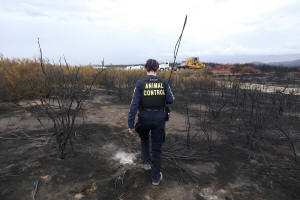California escapes fire season mostly unharmed, but danger could lie
ahead
 Send a link to a friend
Send a link to a friend
 [September 25, 2023]
By Daniel Trotta [September 25, 2023]
By Daniel Trotta
(Reuters) - California is on the verge of recording a second straight
year of relatively mild wildfire damage, after historic rains put the
state on track to avoid the calamities of recent fire seasons.
The state of nearly 40 million people has received 141% of average
precipitation over the past 12 months, according to the state Department
of Water Resources, ending a two-decade drought.
The year included a long spring and a cool summer that in August
produced California's first major hurricane in 84 years, increasing
moisture in the trees, brush, grasses and soil and helping prevent the
typical outbreak of multiple major fires around Labor Day in early
September.
"This is my 47th fire season and this is the first year in a really long
time that we haven't had tons of fires on either side of Labor Day,"
said Tim Chavez, assistant chief of the California Department of
Forestry and Fire Protection (Cal Fire). The fire season unofficially
runs from June to October.
Cal Fire also says the state benefited from a program that nearly
doubled the acreage deprived of fuel by prescribed burns from a year ago
and the addition of 24 aircraft leased during fire season that improved
response times.
"Our biggest compliment is when people never hear about all the fires
that we respond to," Cal Fire spokesman Nick Schuler said.

But the grasses and brush that flourished from the rain will build up
and dry out when drought conditions inevitably return, said Michele
Steinberg, wildfire division director for the National Fire Prevention
Association.
After disastrous years in 2020 and 2021, wildfire damage this season has
been largely limited to the sparsely populated northwest corner of the
state.
[to top of second column]
|

Riverside Animal Control looks for stray dogs as as the Fairview
Fire smoulders near Hemet, California, U.S., September 9, 2022.
REUTERS/David Swanson/File photo

Cal Fire has reported 5,474 wildfires burning 257,407 acres (104,169
hectares) in 2023, similar to the same period of 2022. The five-year
average over the same interval is 6,142 fires and 1.2 million acres
burned.
In 2020, more than 8,600 wildfires killed 33 people and consumed 4.3
million acres.
Western Canada and other parts of the United States were less
fortunate this year, notably Hawaii, where the Lahaina fire last
month killed 97 people, the deadliest U.S. wildfire in more than 100
years.
Experts warn California's favorable conditions could change quickly,
especially in more arid Southern California, where a shift in wind
patterns could dry up excess moisture with warm desert air.
"We're really only a prolonged heatwave followed by a windstorm away
from having major fires," Chavez said.
UCLA meteorologist Daniel Swain said climate change is going to
result in more extreme dry years periodically interspersed with more
extreme wet years. He said 2024 could be above average due to the
weather pattern El Niño.
"We will see those extreme fire seasons return. But we'll also get
these breaks," Swain said on his regular YouTube program last week.
"So, a reprieve. I'll take it."
(Reporting by Daniel Trotta; Editing by Shri Navaratnam)
[© 2023 Thomson Reuters. All rights
reserved.]This material
may not be published, broadcast, rewritten or redistributed.
Thompson Reuters is solely responsible for this content. |